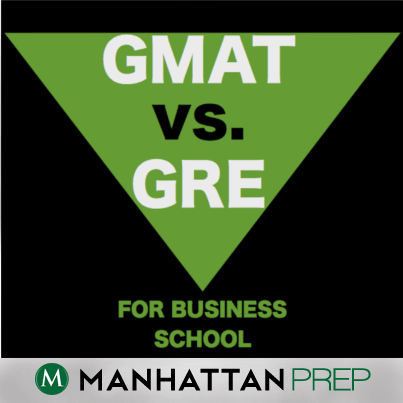GMAT or GRE for b-school? Business Insider consults Manhattan Prep

Whether it’s the GMAT or the GRE, let Manhattan Prep be your guide.
Business Insider sat in on our “GMAT vs. GRE: Which is right for you?” workshop recently in order to glean expert advice from Manhattan Prep’s very own Stacey Koprince.
They found the course to be so informative that they published a nifty piece featuring a decision tree for prospective b-school students grappling with the age-old (or 2-years old, as it were) GMAT vs. GRE quandary; check it out below!
Interested in further reading on the “GMAT or GRE?” question? We’ve made a special page just for you. Want expert advice straight from the source at Stacey’s next workshop? Click here!

“GMAT vs. GRE” decision tree. Credit: Business Insider
The GRE’s not a math test – it’s a foreign language test!
 Imagine that you asked a friend of yours what she got on the Quant section of the GRE. Instead of answering you directly, she said “let’s just say that 4 times my score is a multiple of 44, and 3 times my score is a multiple of 45.”
Imagine that you asked a friend of yours what she got on the Quant section of the GRE. Instead of answering you directly, she said “let’s just say that 4 times my score is a multiple of 44, and 3 times my score is a multiple of 45.”
Could you tell what score she got? If not… you may need to work on your GRE translation skills! Read more
Manhattan Prep’s Social Venture Scholars Program Deadline: July 6th
 Do you work for a non-profit? How about promote positive social change? Manhattan Prep is honored to offer special full tuition scholarships for up to 16 individuals per year (4 per quarter) who will be selected as part of Manhattan Prep’s Social Venture Scholars program. The SVS program provides selected scholars with free admission into one of Manhattan Prep’s Live Online Complete Courses (a $1299 value).
Do you work for a non-profit? How about promote positive social change? Manhattan Prep is honored to offer special full tuition scholarships for up to 16 individuals per year (4 per quarter) who will be selected as part of Manhattan Prep’s Social Venture Scholars program. The SVS program provides selected scholars with free admission into one of Manhattan Prep’s Live Online Complete Courses (a $1299 value).
These competitive scholarships are offered to individuals who (1) currently work full-time in an organization that promotes positive social change, (2) plan to use their degree to work in a public, not-for-profit, or other venture with a social-change oriented mission, and (3) demonstrate clear financial need. The Social Venture Scholars will all enroll in a special online preparation course taught by two of Manhattan Prep’s expert instructors within one year of winning the scholarship.
The deadline is fast approaching: July 6th, 2015!
Learn more about the SVS program and apply to be one of our Social Venture Scholars here.
Should I take the GRE or the GMAT?
 Most business schools now accept both the GRE and the GMAT, so which one should you take? I’ve written on the topic before but it’s been nearly a year and I’ve got some updates.
Most business schools now accept both the GRE and the GMAT, so which one should you take? I’ve written on the topic before but it’s been nearly a year and I’ve got some updates.
The conventional wisdom has been that the math is easier on the GRE. Though many schools do accept the GRE, rumors abound that students who take this test are at a bit of a disadvantage because they are expected to do better on the (easier) quant section. Anecdotally, we have heard a few admissions officers admit that they do think about this (strictly off the record, of course). Most admissions officers, though, have said this doesn’t matter to them at all, including several officers at the top 10 schools.
So we’ve come up with a series of decisions to help you make this choice. The first three questions are “deal-breakers”—that is, a certain answer will point you definitively to a specific test (the GMAT, as it happens). The fourth question is…murkier. We’ll address that in a little bit.
#1: Do all of “your” schools accept the GRE?
This one is obvious. All business schools (that ask for a standardized test score) accept the GMAT. Most—but not all—accept the GRE. If you want to apply to any schools that require the GMAT, such as London Business School MBA (at the time of this publication), then you’ll be taking the GMAT.
#2: Do any of “your” schools prefer the GMAT?
Most schools that accept both tests don’t express a preference between the two. Some schools, though, do say that the prefer the GMAT. They publish this preference right on their web site, so go look up all of your schools and see what they say about the GMAT / GRE requirement for admissions.
As of the date of this article, Columbia, Haas (Berkeley) and Anderson (UCLA) all state that they prefer the GMAT, even though they do accept the GRE. If you want to apply to one of these schools, I recommend that you take the GMAT. (Note: these aren’t the only three schools that prefer the GMAT; I just picked out the three most well-known ones that do. You still need to research your schools!)
#3: Do you want to go into banking or management consulting after b-school?
The major banks and consulting firms ask for GMAT scores when you apply. (Some of them even ask for undergraduate GPA and SAT scores. I think that data is irrelevant after someone has a b-school GPA and GMAT scores but I’m not the one making the hiring decisions!)
Read more
AdmitSee: The Power of Near-Peer Mentors in the Higher Ed Application Process
The following article comes from our friends at AdmitSee. We’ve invited them to share their insight about peer mentors in the grad school application process.
 As you begin the grad school application process, you will have plenty of opinions at your disposal. From your parents, to your current educational institution, to grad schools themselves–you may be bombarded with conflicting opinions on where you should apply. Add to that the plethora of free (and sometimes unreliable) information on the web, often written by anonymous sources, and you’re likely no clearer than when you started!
As you begin the grad school application process, you will have plenty of opinions at your disposal. From your parents, to your current educational institution, to grad schools themselves–you may be bombarded with conflicting opinions on where you should apply. Add to that the plethora of free (and sometimes unreliable) information on the web, often written by anonymous sources, and you’re likely no clearer than when you started!
If you’re fortunate enough to have an older sibling with a tight group of friends who’ve taken career paths that interest you, you’re in luck! Spend lots of time talking with these folks about how and why they picked their grad schools, what they like and don’t like about their programs, and what they wish they knew when they were considering their options.
But, if you’re like most applicants, you need to seek out your own mentors.
Often, people with similar interests who are just a year or two ahead of you will be your most effective mentors. There are many reasons for this, but, to start, you will have an easier time connecting with your near-peers than with someone who’s 20 years older than you. You’ll find more common connections and more shared experiences to bond over. A strong personal connection is the foundation for a great mentor-mentee relationship.
Read more
The GMAT vs. the GRE for Business School
Many business schools now accept either the GRE or the GMAT, so students now have a decision to make: which test should you take? We’ve written on the topic before but this discussion deserves an update now that some changes to the GMAT are gaining more traction.
 Both tests made some significant changes in the past couple of years. These changes were designed to make the test results more attractive to their customers—not you, but the business schools.
Both tests made some significant changes in the past couple of years. These changes were designed to make the test results more attractive to their customers—not you, but the business schools.
The conventional wisdom has been that the math is easier on the GRE. Though many schools do accept the GRE, rumors abound that students who take this test are at a bit of a disadvantage because they are expected to do better on the (easier) quant section. Anecdotally, we have heard some admissions officers admit that they do think about this (strictly off the record, of course). Other admissions officers, though, have said this doesn’t matter to them at all.
Recently, Bloomberg Businessweek reported that Bain & Co, a well-respected management consulting firm, is considering using Integrated Reasoning scores in its hiring process. Most banks and consulting firms already ask for the “regular” GMAT score when recruiting MBA candidates (and sometimes they even ask for your SAT scores!). If these companies begin to require IR, then someone who took the GRE could find themselves at a disadvantage during the hiring process—or even scrambling to take the GMAT during the second year of b-school while going through recruiting. Yikes!
So this question of whether to take the GMAT or the GRE has become a much more complicated calculus of a decision. There is no one-size-fits-all answer, but here are some guidelines to consider as you figure out the right decision for you.
Your Performance
Do you actually exhibit a markedly different performance level on the two exams? Most people have pretty similar results.
To figure this out, you’re going to take two practice tests (one of each). Before you do that, learn about the different question formats on both exams.
GMAT
Quant: about half of the questions are your standard multiple choice. The other half are a weird type called Data Sufficiency. You’ll definitely want to learn how those work before you take a practice test (your next task).
Verbal: if you’ve ever taken a standardized test before, then you’ll be very familiar with Reading Comprehension questions. Critical Reasoning questions are similar, but much shorter, and the questions are more argument-based (how to strengthen or weaken a conclusion, for example). Sentence Correction questions require knowledge of grammar and meaning. You don’t need to study that yet, but you should just learn how the question type works.
In a nutshell, you’ll be given a sentence with a portion underlined. The first answer, (A), will repeat whatever was underlined. The other 4 answers will offer different variations for that underlined text. Only one is correct!
Essay: you don’t need to prep for this before your first practice test.
Integrated Reasoning: these questions combine math and verbal topics in four new question formats that you probably won’t have seen before. You’ll definitely want to investigate those a bit before your practice test, just to see how each one works. Here are some example problems: Read more
Friday Links: Online Graduate Classes, Productivity Tools, & More!
 Happy Friday and happy Fourth of July Weekend! Here’s our weekly roundup of grad school news and tips:
Happy Friday and happy Fourth of July Weekend! Here’s our weekly roundup of grad school news and tips:
Leverage International Roots for U.S. Grad School Applications (U.S. News Education)
Emphasizing cultural differences is a natural way prospective international graduate students can craft unique applications.
What is an Online Graduate Class Like? (About.com Graduate School)
Online classes hold some similarities with traditional on-ground courses, but there are also many differences.
6 Important Things Nobody Tells You About Grad School (Cracked)
If you’re considering or already in postgrad work, take some helpful advice from someone who already has two and a half postgraduate degrees under his belt.
Policing Your Productivity: 7 Tools to Help You Focus (Entrepreneur)
Are you easily distracted by social media and entertainment sites? Keep your focus, especially when it’s time to study, with these helpful programs.
Did we miss your favorite article from the week? Let us know what you’ve been reading in the comments or tweet @ManhattanPrep
POWERPREP II for Mac is here!
 Can I use POWERPREP on a Mac? This is one of the questions most frequently asked by students calling us here at Manhattan Prep.
Can I use POWERPREP on a Mac? This is one of the questions most frequently asked by students calling us here at Manhattan Prep.
Well, I’m happy to say that my answer to this question is now a resounding, YES! The long awaited introduction of ETS POWERPREP software for Mac users is here! As of July 2013, ETS offers a Mac-compatible version of their terrific practice test software. Mac-loving students will no longer have to worry about borrowing their roommate’s cousin’s boyfriend’s PC to take their practice GRE.
For those of you who aren’t familiar with the software, POWERPREP is free practice exam available directly from ETS, the administrators of the GRE. POWERPREP is an excellent resource, one that we recommend all of our students use. The software includes two computer-based tests, sample Analytical Writing topics, scored sample essays and reader commentary, test-taking strategies, a math review, and test tutorials. We recommend that students save at least one POWERPEP II test until fairly close to their real exam to get a nearly exact practice run of what will happen on test day.
So, rejoice, Mac-users, POWERPREP for Mac is now available.
Friday Links: Student Loan Debt, Summer GRE Reading, and More!
 Happy Friday and happy summer! Get a jump start on your summer reading with a few of this week’s top grad school articles:
Happy Friday and happy summer! Get a jump start on your summer reading with a few of this week’s top grad school articles:
When Grad School Does and Doesn’t Make Sense (USA Today College)
Here are 10 circumstances when grad school may make sense and 10 when it might not.
How to Choose the Right Graduate Program? Consider Your Personal Life (About.com Grad School)
Sometimes you have to look beyond academics to choose the right graduate school program for you.
5 Tips for Applying to Graduate Programs in Clinical or Counseling Psychology (About.com Graduate School)
Be on your game to improve your odds of admission to graduate programs in psychology with these five helpful tips.
How to Tackle Student Loan Debt as Quickly as Possible (USA Today College)
Here are some wise steps to pay off your student debt as quickly and efficiently as possible.
Read Your Way to a Higher Score: Summer Reading Recommendations from our GRE Instructors (Manhattan GRE Blog)
To celebrate the first day of summer, we’re bringing back a post from the archives. Check out our list of summer reading recommendations!
Did we miss your favorite article from the week? Let us know what you’ve been reading in the comments or tweet @ManhattanPrep
Friday Links: Grad School in the Humanities, Choosing the Right Grad Program, & More!
Here’s a roundup of our favorite GRE links from the week. Enjoy the weekend!
Don’t Be Afraid of Going to Graduate School in the Humanities (Pacific Standard)
Full-time, tenure-track professorships in the humanities are famously scarce. But that’s not a reason to avoid an advanced degree.
3 Concerns of International Grad School Applicants (U.S. News Education)
Here are some answers to common application questions from prospective international graduate students.
How to Choose the Right Graduate Program? Consider Your Personal Life (About.com Graduate School)
Sometimes you have to look beyond academics to choose the right graduate program for you.
3 Key Ways College, Graduate School Differ (U.S. News Education)
Grad School isn’t a continuation of college. Be prepared for larger workloads and more responsibility.
Graduate Degrees with Strong Career Prospects (Graduate Guide)
Here are some of the best fields to consider in graduate school when it comes to the current job market.
